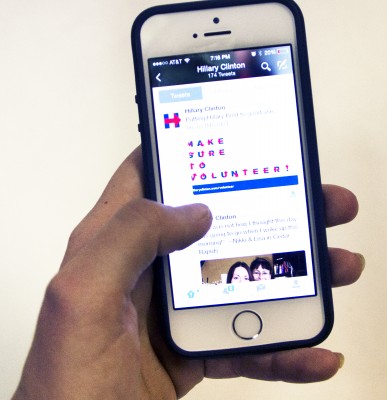
In just over a year and a half, United States citizens will be voting for a new president. They will also be tweeting about him or her.
In anticipation, Boston University’s College of Communication held a panel titled “Social Media and National Policy: Why hasn’t it worked? Will it?” Organized by the Division of Emerging Media Studies and COM’s Center for Mobile Communication Studies, the April 8 panel focused on social media and its effect on voters.
“What inspired this is the realization that social media has tremendous power to affect people’s lives, including the governments under which they live,” said James Katz, a professor in Boston University’s College of Communication and director of the school’s Division of Emerging Media Studies. “We have seen social media used to overthrow governments, [and] we have seen social media used to elect candidates, but we have not seen much in the way of social media being used effectively by political leaders to help guide policy in such a way that the will of people can be reflected.”
The panel featured experts from various universities: Michael Bruter, a professor at the London School of Economics and Political Science; Deen Freelon, an assistant professor of communications studies at American University; Daniel Kreiss, an assistant professor in the School of Media and Journalism at the University of North Carolina at Chapel Hill; and Anshul Jain, a BU political science graduate student.
The main issue Bruter, who authored a study looking at the relationship between social media and youth voter participation, addressed in the panel was the lack of participation by young people in elections. This may not be due to a lack of interest in politics, Bruter said, but rather that young people are “cynical and disappointed” in the government. Kreiss also attributed low voter turnout to this cynicism, but expressed hope for the future.
“There are certainly candidates who can inspire young voters,” he said. “I think [U.S. President Barack] Obama did that in both of his elections. There have certainly been other examples of that. It depends on who the candidate is, their rhetoric, their timing [and] the context. You have to make people care.”
Bruter also explained that there is a difference between younger and older voters. Older voters feel a sense of duty to vote, while younger people feel less of an obligation, he said. Bruter said his experiment was inspired by the assumption that politicians feel they can close this gap by reaching out to young voters via social media.
Bruter’s study, however, proved this assumption to be incorrect. Centered in six countries — the United Kingdom, Spain, France, Austria, Finland and Hungary — the experiment involved mock elections where half of the participants were exposed to social media campaigns and the other half to traditional campaigns. Half of the elections were located at polling stations, while the other half was online. In the end, the study concluded that for young people, traditional campaigns are more appealing than the social media campaigns. The study found that what really mattered was not the medium, but the substance of the message that politicians sent.
In the 2012 presidential election, social media was a heavily-incorporated tool that proved successful for certain campaigns due to its focus on the message, rather than the medium.
“If you are going to use social media in a campaign, you adapt a message that taps into things people want to hear about,” Bruter said. “Obama’s [campaign] worked because he used social media to propose a message different than what people are hearing.”
Although social media was initially created as a way to connect with family and friends, it has evolved to support politics as well. In terms of political campaigns, Kreiss said, it is mainly used as a mobilization tool.
“I would say social media probably does the best to mobilize people to get involved, to donate money, to turn out to vote,” he said. “That’s where the effects would be, in terms of pushing people over the edge, but not necessarily converting people to vote for a particular candidate.”
However, Katz said the remaining question surrounds the best way to use social media in guiding policy, and it is a challenging one to answer.
“I think what we found out in our day-and-a-half of discussion is that we know very little about everyday uses of social media that would be applicable to governments,” Katz said. “In other words, social media are such a huge set of activities that can be used in so many ways that … we weren’t able to focus in on that. We were able to identify some interesting research problems for political science, communication scholars and sociologists to investigate to get a better view on things.”























































































































